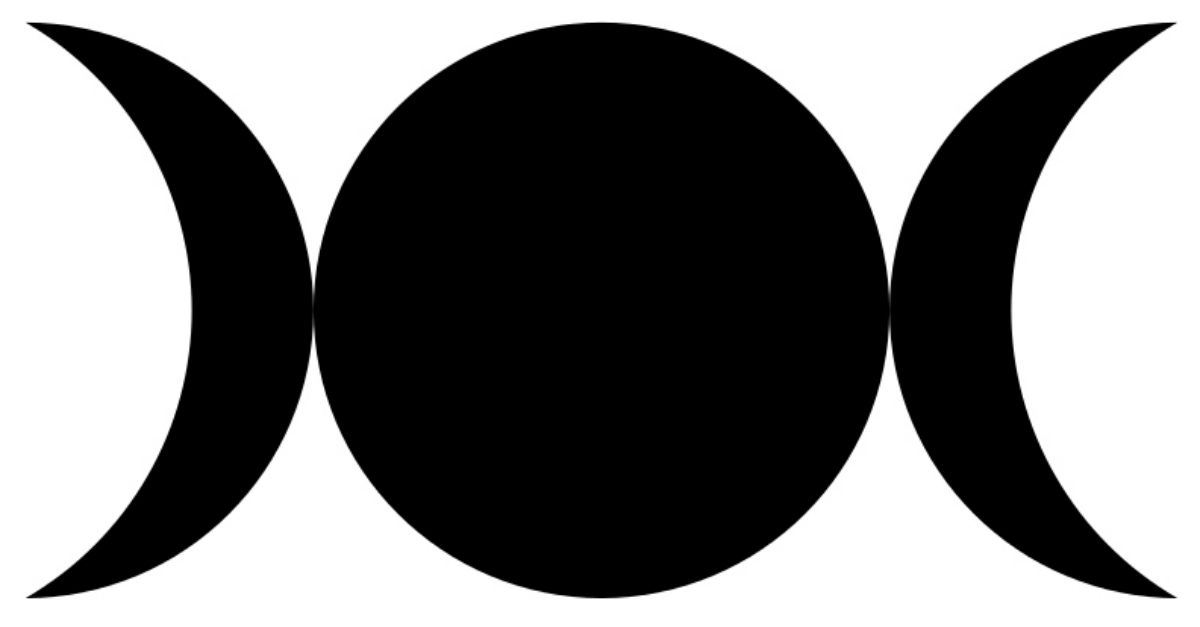Wicca is a modern movement, rooted in the occult and primarily practiced in the West. It’s based on pagan practices and beliefs common in Western and Northern Europe before Christianity took root in the area around the Middle Ages. Followers of modern Wicca are primarily women and girls due to the religion’s focus on female power and goddess worship. Wicca is rooted in the Old English word, wicce, which means “to bend or shape nature to your service.” This meaning is the basis of Wiccan witchcraft practices.
Wiccan Beliefs and Practices
Wicca is typically theistic, recognizing two divinities: the Goddess and the God (or the Horned God). In more traditional Wicca groups, the God is the prime deity. But in more modern, feminist Wicca groups, the Goddess is the main deity or sometimes the only recognized deity.
The Goddess is traditionally associated with forces of the moon, stars, and sea, while the God is associated with the sun and forests. The Goddess is also seen as the Mother Goddess.
Followers of the Wicca movement focus their worship on one or both deities as well as elements of nature. The practices of witchcraft, incantations, and divination (usually via tarot cards) are also significant aspects of Wicca.
Specific, detailed Wiccan beliefs are difficult to identify because there is not a singular, authoritative book that all Wiccans live by. Also, the Wiccan religion is represented by many different groups. Wicca is more focused on the practice (witchcraft, rituals, ceremonies, etc.) rather than adhering to any particular doctrine or truth. However, a few basic beliefs and practices seem to be common to most followers of Wicca.
- Wiccans observe eight annual Sabbats (holidays) with rituals and ceremonies.
- Wiccans revere The Elements: Earth, Air, Fire, and Water, along with the fifth element of Spirit, which is present in the other elements. Consequently, environmentalism is often integral to Wicca.
- Wiccans view magic not so much as a belief in the supernatural, but rather as an intentional manipulation of the natural Elements.
- “Harm none,” is Wicca’s most widely held rule.
- Wicca’s Threefold Law is another commonly held rule, which hints at karma. The Threefold Law affirms that whatever magic a witch emits will return to him or her three times.
- The Wicca religion does not actively promote evangelizing others, partially because of its openness to accept other religions and even borrow from them.
- The Wiccan religion teaches a reincarnation or rebirth after death.
Wicca and the Occult
The modern Wicca movement is rooted in the occult and was particularly influenced by Aleister Crowley, Gerald Gardner, and Doreen Valiente. The occult is a word generally meaning “secret, hidden from view, or not easily understood.” Specifically, the occult refers to “matters regarded as involving the action or influence of supernatural or supernormal powers or some secret knowledge of them.”
History of the Wicca Movement
Gerald Gardner was a British government worker who became known as “the father of modern Wicca.” Before World War I, Gardner spent decades traveling overseas, mostly in Asia, where he was intrigued by folk religions and magic. When Gardner returned to England in the 1930’s, he learned more about ancient European witchcraft and magic. He soon became involved with various occultist groups, eventually joining a local coven (meaning a group of witches). Gardner adapted practices and traditions from a few religious and occultic sources, including Aleister Crowley’s writings, to form the first Wiccan tradition, now known as Gardnerian Wicca. Crowley was a British occultist and writer. By the time Gardner died in 1964, the Wicca movement had spread across the U.K. and U.S.
Gardner’s High Priestess, Doreen Valiente, helped him organize his unsystematic collection of rituals and spells, The Book of Shadows. Although Valiente herself doubted the authenticity of Gardner’s writings, she brought unity and injected poetry into the Wiccan rituals and ceremonies for others to implement and practice. Even after her death in 1999, Valiente’s writings continue to heavily influence the Wicca movement.
In 1963, Gardner initiated Raymond Buckland, a British immigrant to America who worked to popularize Gardnerian Wicca in the U.S. through establishing a coven in New York, starting a witchcraft museum, and taking up his own writings. Buckland went on to form a new witchcraft sect, Seax-Wica, about a decade later. Buckland died in 2017.
Growth of the Wicca Movement
Wicca has increased in popularity and diversity with new sects such as Alexandrian Wicca, Algard Wicca, Georgian Wicca, Druidic Wicca, and Eclectic Wicca.
Data on the number of Wiccans is scarce, but what is available suggests consistent growth in the U.S. and U.K.
Trinity College conducted a nationwide survey in 1990, counting an estimated 8,000 Wiccans in the U.S. Their survey in 2008 found 340,000. And according to Pew Research data in 2014, anywhere from 1 to 1.5 million people in the United States identify as Wiccan or Pagan. A 2011 government census in the United Kingdom discovered that 12,000 people in the England and Whales claim a Wiccan identity.
Wiccan Rede
The rede (meaning: advice or counsel) is a poem that directs Wiccan morality, as well as that of other religions based on witchcraft. Not all Wiccans follow the rede, and it’s not always observed as an absolute rule.
The Wiccan Rede’s date of origin is disputed, but it was likely written during mid-late 20th century, despite its intermittent use of Middle English words.
A shorter phrase is often used in place of the full rede: “An ye harm none, do what ye will.” Similar variations include:
- “An it harm none, do what thou wilt.”
- “That it harm none, do as though wilt.”
- “Do what you will, so long as it harms none.”
Aleister Crowley’s The Book of the Law, published in 1904, included a teaching similar to the Wiccan Rede. Crowley claimed a spirit named Aiwass told him the teaching: “Do what thou wilt shall be the whole of the law.” But the French writer, Francois Rabelais, had already penned the phase in his 1693 book, Gargantua and Pantagruel.
The “Charge of the Goddess,” attributed to Doreen Valiente, is another collection of verses read during Wicca gatherings and rituals.
Wiccan Symbols
Pentagram: This word comes from Greek and means “five-pointed star.” Although the pentagram has served as a symbol in many religions for thousands of years, in Wicca, each of the five points represents the five elements: Earth, Air, Fire, Water, and Spirit.
Pentacle: This word is rooted in both Greek and Latin. A pentacle is basically a pentagram with a circle around it and has similar meaning of a pentagram. To some Wiccans, the circle represents white magic, which is believed to be harmless.
Sigil: This is a Latin word meaning, “a sign, mark, or seal.” These are not set, official symbols, but rather personally created symbols believed to help in magic spells. Sigils are designed via different ways (using letters, numbers, and/or images), but once the symbol is on paper, the Wiccan will focus an intense feeling onto it by staring at it, then destroy the sigil to release its power.
Triple Goddess Symbol: This symbol is the side-by-side lineup of a waxing, full, and waning moon. It represents three aspects and powers of the Goddess as well as women in general: the maiden, mother, and crone.

(Triple Goddess Symbol) Photo Credit: WikiMediaCommons/AnonMoos
Wiccan Spells
In Wicca, natural elements are believed to be harnessed in spells to achieve a Wiccan’s desired outcome. A spell is usually performed with a combination of incantations, actions, and ingredients specific to the spell.
Wiccan publications promote pre-written spells, but Wiccans can also write their own to find healing, wealth, love, or any other desire as long as they don’t violate the Wiccan Rede and they mind the Threefold Law.
Wiccan Holidays
The eight major Wiccans holidays – Sabbats – correspond to the cycles of the sun and moon and are observed by gathering to practice rituals and ceremonies.
- Yule occurs on the winter solstice and represents the Wiccan new year.
- Imbolc is February 2 and celebrates the end of winter focusing on themes of renewal, fertility, and purification.
- Ostara occurs on the spring equinox and celebrates hope, new beginnings, renewal, and balance.
- Beltane is May 1 and is a Wicca holiday highly focused on sexuality and sensuality.
- Lithaoccurs on the summer solstice and celebrates growth, abundance, and masculine energy.
- Lammasis either August 1 or 2 and focuses on themes of first fruits, harvest, using skills and talents.
- Mabonoccurs during the fall equinox and celebrates harvest, abundance, and gratitude.
- Samhain is either October 31 or November 1 and it focuses on death, divination, honoring ancestors, and troublemaking.
What the Bible Says
1. Worship the LORD alone. Wiccans often honor the natural elements as much as the Wiccan deities. But the Bible teaches that people are to worship God the creator, not his creation (Exodus 20:3, Psalm 104, Luke 4:8). Creation worship, while experiencing a resurgence in the modern Wicca movement, is nothing new. The Apostle Paul lamented this sinful behavior in Romans 1:25.
“They exchanged the truth about God for a lie, and worshiped and served created things rather than the Creator—who is forever praised. Amen.”
2. The LORD is sovereign. Wiccans rely on the power found in themselves, in nature, and/or in other spiritual forces. But the Bible teaches that this is not only forbidden (Deuteronomy 18:9-13, Leviticus 19:31), but also futile because the LORD is always in complete control and possesses all power. Any desired outcome accomplished in witchcraft or a spell is a trick designed to deceive the person from the truth of the God who loves her or him (2 Corinthians 4:4, 1 Timothy 4:1). This deceiver will be ultimately thrown away into an eternal lake of fire (Revelation 20:10), but until then, he is not to be followed or sought out (1 Corinthians 10:20-21).
Read more Bible verses about demonic power at BibleStudyTools.com.
3. The LORD is the author of truth. Those who practice Wicca are encouraged to do what they want as long as it does no harm. But this rule is impossible to keep, in part because no one can fully know the complete consequence of doing “what ye will,” as the Wiccan Rede states. Even the idea of harm is a relative concept without the standard of absolute truth, communicated through God’s word.
Indeed, “the god of this age has blinded the minds of unbelievers, so that they cannot see the light of the gospel that displays the glory of Christ, who is the image of God,” (2 Corinthians 4:4).
“Wicca may seem attractive, magical and different, but it does not give eternal life and a relationship with the God of the universe,” according to this Focus on the Family article.
Sources:
- Britannica.com, Wicca. J. Gordon Melton, 2018.
- Britannica.com, Aleister Crowley. The Editors of Encyclopaedia Britannica, 2019.
- Exemplore.com, “Witch Sigils: Easy Magick.” 2018.
- FocusontheFamily.com, “Hidden Traps of Wicca.” Catherine Sanders.
- TheGospelCoalition.org, “9 Things You Should Know About Wicca and Modern Witchcraft.” Joe Carter, 2018.
- ThoughtCo.com, “Author Ray Buckland.” Patti Wigington, 2018.
- ThoughtCo.com, “Who Was Doreen Valiente?” Patti Wigington, 2018.
- ThoughtCo.com, “Who Was Gerald Gardner?” Patti Wigington, 2017.
- Qz.com, “The US Witch Population Has Seen an Astronomical Rise.” Sangeeta Singh-Kurtz & Dan Kopf, 2018.
- WiccaLiving.com, Introduction to the Core Wiccan Beliefs.
- Wikipedia.org, “Wiccan Views of Divinity.”
Main Photo Credit: GettyImages/Kikovic



